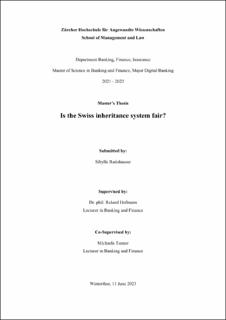Please use this identifier to cite or link to this item:
https://doi.org/10.21256/zhaw-29651| Publication type: | Master thesis |
| Title: | Is the Swiss inheritance system fair? |
| Authors: | Rutishauser, Sibylle |
| Advisors / Reviewers: | Hofmann, Roland Tanner, Michaela |
| DOI: | 10.21256/zhaw-29651 |
| Extent: | 97 |
| Issue Date: | 2023 |
| Publisher / Ed. Institution: | ZHAW Zürcher Hochschule für Angewandte Wissenschaften |
| Publisher / Ed. Institution: | Winterthur |
| Language: | English |
| Subject (DDC): | 346: Private law (CH) |
| Abstract: | There are two ways to become rich: either through inheritance or through one’s own efforts. If people become rich mainly due to heritage, the question arises if it is considered fair in our modern society. The Swiss inheritance law has been adapted as of January 1st, 2023. The adaptations of the law should put it in the context of our current society but have triggered debates and discussions around the fairness of the Swiss inheritance system in various media. While some argue that the current system is fair, others believe there is room for improvement. This thesis answers the research question of whether the Swiss inheritance system is fair. The work highlights wealth inequality in Switzerland, the new Swiss inheritance law, and inheritance taxation. Moreover, the consequences of unequal distribution, leading to the discussion of concepts of fairness are shown. Following this, different concepts of justice used in science and religion are elaborated. The final topic of the literature review addresses perceptions of wealth and inheritance fairness. To answer our research question, a survey is conducted among 20–40-year-olds living in Switzerland. The drivers of inheritance fairness identified are included in the questionnaire. The questionnaire is broken down into seven sub-questions that help answer the research question. The most important commonalities to define whether the Swiss inheritance system is perceived as fair have been identified: socio-economic background, political affiliation, received or expected inheritance, perceived fairness of suggested / current policies, fairness considerations, relation to the heir, value of bequest and a meritocratic fairness view. The Swiss inheritance system has the particularity of sub-centralized tax collection, and the relationship to the decedent significantly impacts the inheritance tax rate, as up to seven different relationship types are distinguished. There are also great cantonal differences in tax rates in Switzerland. The law establishes different compulsory shares, and the testators are therefore not completely free to decide how to distribute their assets at their deaths. The results confirm that political affiliations have the most decisive influence on one’s perceptions of fairness. It was found that more conservative voters favour distribution less than Social Party voters. Consequently, with its features, the Swiss inheritance system is perceived as fairer by voters of the SP and the Grüne than by voters of the FDP or the SVP. Furthermore, the fairness perceptions change between the two extreme income groups. Higher earners were likelier to agree with more significant imbalances than lower-income groups. Respondents from the lowest income group are more likely to agree with the current Swiss inheritance system than respondents from the highest income group. Besides, the results suggest that meritocratic views impact the fairness perception of the Swiss inheritance system. Surprisingly, the respondents do not fully believe in meritocracy and think it is fair for people to get rich through inheritances or the lottery. A vital dilemma of meritocracy was not found, only slight tendencies. The research shows that perceptions of fairness vary among individuals. Factors such as household income, political affiliation, meritocratic views, and the relationship between the testator and the heir influence these perceptions. The respondents believe it is fair for people to become wealthy through inheritances or gifts. However, they consider wealth acquired through personal efforts fairer. Finally, there is strong disagreement regarding the differences in inheritance taxation across cantons. The results illustrate that people generally agree with progressive taxation and exemption amounts but perceive different tax rates based on the relationship to the heir only as partially fair. |
| URI: | https://digitalcollection.zhaw.ch/handle/11475/29651 |
| License (according to publishing contract): | CC BY-NC-ND 4.0: Attribution - Non commercial - No derivatives 4.0 International |
| Departement: | School of Management and Law |
| Appears in collections: | MSc Banking and Finance |
Files in This Item:
| File | Description | Size | Format | |
|---|---|---|---|---|
| 2023_Rutishauser_Sibylle_MSc_BF.pdf | 2.65 MB | Adobe PDF |  View/Open |
Show full item record
Rutishauser, S. (2023). Is the Swiss inheritance system fair? [Master’s thesis, ZHAW Zürcher Hochschule für Angewandte Wissenschaften]. https://doi.org/10.21256/zhaw-29651
Rutishauser, S. (2023) Is the Swiss inheritance system fair? Master’s thesis. ZHAW Zürcher Hochschule für Angewandte Wissenschaften. Available at: https://doi.org/10.21256/zhaw-29651.
S. Rutishauser, “Is the Swiss inheritance system fair?,” Master’s thesis, ZHAW Zürcher Hochschule für Angewandte Wissenschaften, Winterthur, 2023. doi: 10.21256/zhaw-29651.
RUTISHAUSER, Sibylle, 2023. Is the Swiss inheritance system fair? Master’s thesis. Winterthur: ZHAW Zürcher Hochschule für Angewandte Wissenschaften
Rutishauser, Sibylle. 2023. “Is the Swiss Inheritance System Fair?” Master’s thesis, Winterthur: ZHAW Zürcher Hochschule für Angewandte Wissenschaften. https://doi.org/10.21256/zhaw-29651.
Rutishauser, Sibylle. Is the Swiss Inheritance System Fair? ZHAW Zürcher Hochschule für Angewandte Wissenschaften, 2023, https://doi.org/10.21256/zhaw-29651.
Items in DSpace are protected by copyright, with all rights reserved, unless otherwise indicated.